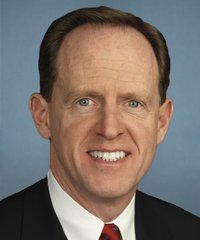
Senator Pat Toomey joined the U.S. Senate from Pennsylvania in 2011 on a platform of economic and job growth, restoring fiscal responsibility, and creating stronger, safer communities.
Sought out by his colleagues for his views on financial reform and budgetary issues, Senator Toomey was labeled by the Philadelphia Inquirer as "a leading voice on money matters."
During his time in the Senate, Senator Toomey has successfully led efforts to cut taxes for families, make our business tax code more competitive, end wasteful federal spending, and protect children from abusers.
Since the start of the COVID-19 outbreak, there has been understandable concern and uncertainty. Those on the frontlines-health care professionals, emergency responders, retail workers, public transit workers, and many others-have worked day and night to help ensure our safety and well-being, and to try to provide a degree of normalcy in our daily lives. While these times are challenging, we will get through this together.
I've set up this page to provide useful resources and information to help you, your family, your neighbors, and the small businesses that sustain communities all across Pennsylvania. This page will be updated regularly. While my offices are all currently operating remotely, we stand ready to help as best we can. if you have a constituent casework question regarding the CARES Act or any of the legislation passed to combat COVID-19, please email Covid19Response@toomey.senate.gov. All other comments should be submitted through our traditional web portal here.